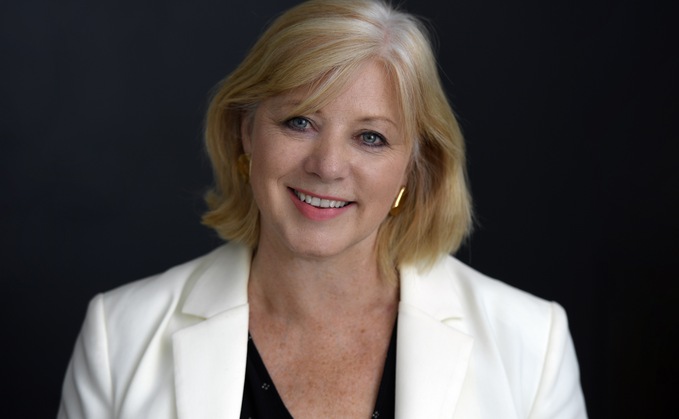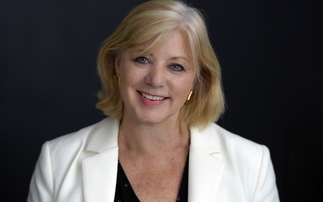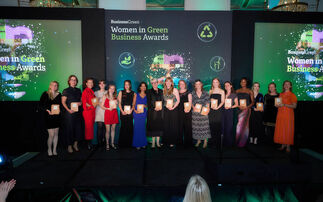
Credit: Chronos Sustainability
Ahead of the company's sponsorship of the UK Green Business Awards, Chronos Sustainability’s Nicky Amos reflects on working on the first ever sustainability report by a UK Plc and setting up an award-winning consultancy
Managing director and co-founder of Chronos Sustainability Nicky Amos has led the specialist advisory firm's efforts to deliver a step change in social and environmental performance by supporting investors, companies, intergovernmental organisations, non-governmental organisations with policy and strategy development, implementation and reporting.
Before co-founding Chronos, Amos led the Body Shop's corporate responsibility strategy in the 1990s and early 2000s, as well as spearheading a series of major sustainability programmes and initiatives including the Business Benchmark on Farm Animal Welfare measure of company performance on farm animal welfare.
She is a mentor for the Global Thinkers Forum's long-term foundational mentorship programme, Athena, where women from Middle East and North Africa are paired with mentors across the world. Amos is also a trustee of the Fat Face Foundation, an organisation that aims to support people in communities where outdoor clothing brand, Fat Face, sources, manufactures, retails and distributes its products.
BusinessGreen: What was your first role in the green economy and what attracted you to the sector?
Nicky Amos: I have worked in the green and sustainable economy for over three decades. My first role was with The Body Shop in 1997, working with the visionary Anita Roddick. In fact, The Body Shop produced what would become the first ever sustainability report by a UK PLC. 'Trailblazing' was the description by United Nations Environment - Finance Initiative
What green projects or achievements are you most proud of?
At The Body Shop I led the collaborative process that established the Roundtable on Sustainable Palm Oil - which has since enabled over five million hectares of land around the world to be certified for sustainable palm oil production.
But I'm most proud of co-founding Chronos Sustainability alongside Rory Sullivan. Since setting up Chronos eight years ago, the company has driven major green initiatives including Climate Action 100+, the Global Investor Commission on Mining 2030, and the Business Benchmark on Farm Animal Welfare.
What parts of the green economy are you most excited about?
Most of the environmental challenges we face are systemic in nature. I am most excited when policy makers, companies or multi-stakeholder initiatives collaborate on action that will hardwire sustainable and climate-positive activity into daily business or wider market systems. It is here where our skills and expertise at Chronos come to the fore; systemic issues require knowledge of finance and financial markets, of corporate strategy and risk management, of public policy design and implementation, of consumers and markets. It also requires deep technical knowledge, such as the expertise we have in biodiversity, wildlife and the wildlife trade, greenhouse gas emissions measurement and management, adaptation planning, human rights and animal welfare.
What developments do you think are currently under the radar?
I'd like to see more honest and frank discussion about the trade-offs that many sectors will need for the low carbon transition to succeed. Few solutions are perfect. The production of solar panels raises human rights concerns linked to forced labour, while renewable energy installations can involve the exploitation of migrant workers. Meanwhile, bioplastics (as a replacement for petroleum-based plastics) is associated with unfavourable land use change, pollutants used in crop cultivation, and greenhouse gas emissions from decomposition. None of these issues is insurmountable but companies must be cognisant of the downside risks as well as the positive impacts and be transparent about how they are managing such trade-offs.
What is the biggest misconception about the green economy?
The biggest misconception is that we cannot make a difference. And the biggest frustration is seeing people give up or get cynical when change isn't easy or isn't delivered quickly.
We set Chronos up with the explicit objective of making a difference at scale on some of the key issues faced by our planet. We wanted to show that it is possible for motivated people to make a difference. And we wanted to show that change is possible with the right determination and staying power.
What do you see as the biggest challenges to the net zero transition?
The net zero transition has always suffered from a 'tragedy of the commons' in the sense that if not all high-emitting countries move forward with the same climate ambition, then it undermines the climate action of others - hindering positive collective climate action.
Political challenges are also high on the agenda right now, but ultimately the biggest challenge is that people see these challenges and decide to give up. Giving up is not an option. The challenges we face are global in scale, they are complex, and many people are incentivised to act in ways that are not in the interests of our planet. It is in these moments that a willingness to believe in our ability to deliver change, and to work to effect that change is so important.
What advice would you give to someone looking to work in the green economy?
This is something we think about a lot at Chronos as we are enthusiastic supporters of the next generation of sustainability professionals, including through sponsorship of the Chronos Sustainability Prize at The London School of Economics, and through our guide to careers in sustainable finance
One quality that consistently shines through in our younger team members is their genuine passion for making a meaningful difference in the world. My advice is to hold on to that passion throughout your career. When it is combined with the ability to gather solid data, and to present clear evidence to effectively persuade others - you gain real power to influence decisions that will help shape a better society and a healthier planet for us all.
What green initiatives can we expect to see in the coming years?
In today's unpredictable political and economic climate, it's easy to assume that progress on sustainability might slow down. But despite the headlines - from policy shifts in the US to economic pressures in Europe - I believe we'll continue to see companies doubling down on green initiatives in the years ahead.
What's driving this resilience? It's the convergence of several powerful forces: technological innovation, tighter regulation, and growing public demand for action on climate change, inequality, and health. These pressures are only intensifying.
The economics is also clear. Renewables and electric vehicles continue to offer compelling value, and that's not just theory - it's playing out in the real world. Renewables now account for nearly a quarter of Europe's energy use, a milestone that speaks volumes about both market viability and long-term momentum.
Meanwhile, regulations such as the Corporate Sustainability Reporting Directive (CSRD) and the Sustainable Finance Disclosure Regulation (SFDR) will drive a wave of professionalisation across the sustainability sector. These frameworks will raise expectations, sharpen accountability, and push sustainability into the core of business strategy.
Inevitable, there will be bumps along the way. But the direction of travel is clear - and the smart money is on those who keep moving forward.
What would your green superpower be?
I'm a strategic thinker driven by a strong sense of purpose, which means I'm not easily swayed by short-term noise. My ideal superpower is to look beyond the headlines and envision a greener, more sustainable future. With that perspective, we can chart a clearer path toward a more balanced world - focusing on bold ideas that translate into meaningful, real-world progress.
Nicky Amos is co-founder of Chronos Sustainability
Chronos Sustainability is a sponsor of the UK Green Business Awards 2025, which will take place on the evening of 11 June at The Brewery in London. You can reserve your place at the awards here.






